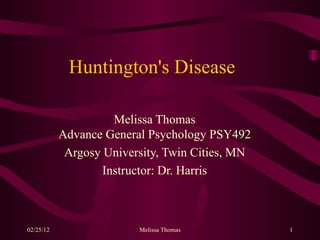
Huntingtons Disease Melissa Thomas Psy492
- 1. Huntington's Disease Melissa Thomas Advance General Psychology PSY492 Argosy University, Twin Cities, MN Instructor: Dr. Harris
- 4. Pictures of Mutated Chromosome 4
Hinweis der Redaktion
- -George Huntington who first called the disease “hereditary chorea” discovered Huntington’s disease. Huntington’s disease was found in 1872. The word Chorea is Greek and it means dance. The reference, Chorea, was given because of the involuntary movements that occur to the body. -The disease affects the nerve cells in the brain. Currently only a couple medications are available to help with some of the symptoms (Shannon, 2009).
- - The brain cells are sensitive to the larger form of Huntington and will destroy them, although scientists do not know how this happens.
- -Pictures of the chromosome. The longer the “tail” on chromosome 4 the more time the CAG is repeated. -James F. Gusella and colleagues studied for years to find the gene for HD and to understand what they were looking for . “It was so long and so weird,” says MacDonald (pg a17), an associate professor of neurology at the Harvard Medical School. They discovered the gene five years prior but did not know much more about the gene.
- -If the child inherits the good copy he or she will not develop Huntington’s disease, where as their sibling, who has inherited the faulty gene will develop the disease. -In some cases there may be a new error in the gene - a mutation (it has to start somewhere) (Medical News, 2009).
- - CAG is the genetic code for the amino acid glutamine . The more times the code the repeated the higher chance one has inheriting the disease. Graph retrieved from http://en. wikipedia .org/ wiki /Huntington's_disease
- - Although most people with HD generally have good appetites, the muscles in the mouth and the diaphragm may not work properly, making the whole experience of eating seem cumbersome, frustrating and messy.
- - Choking tends to occur more when the liquid is thin, like water. During the later stages choking becomes a major concern.
- A psychiatric evaluation most likely will be recommended (Medical News, 2009). - If a person is diagnosed with the disease (which can only be done when the patient is 18) there is no way to predict when the disease sets in or how serious the symptoms will be.
- The disease causes involuntary movements and jerking or twitching as well as problems swallowing, speaking, and memory (Shannon, 2009). Huntington’s Disease is a very progressive brain disease. There are only a handful of other diseases that cause as many interrelated disabilities.
- - There are many challenges that are caused by HD, which include forgetfulness and disorganization. Therapy teaches a person to use short sentences, break tasks down into small steps, offer limited choices, have a daily routine and stick to simple to do lists and tasks.
- - Repetitive tasks can help in remembering daily tasks and learning new ones can help as well but often times recalling new information can be hard to remember on their own. Time is also a challenge, as a person’s sense of time does not register (Duff, 2009).
- - Knowing or not knowing greatly impacted being able to go on with their lives, such as school, career, personal health and investments (Hagberg, 2011).
- My own personal hopes is that enough trials and experiments will be done so that 30 years from now there will be a drug that will severely slow down the symptoms and give a person facing the disease a chance to live a full and healthy life. It is an inevitable disease with no cure and not much treatment. The evidence shows us that there is much to learn, as the gene was only found 1993, and there is still testing and trials being conducted.